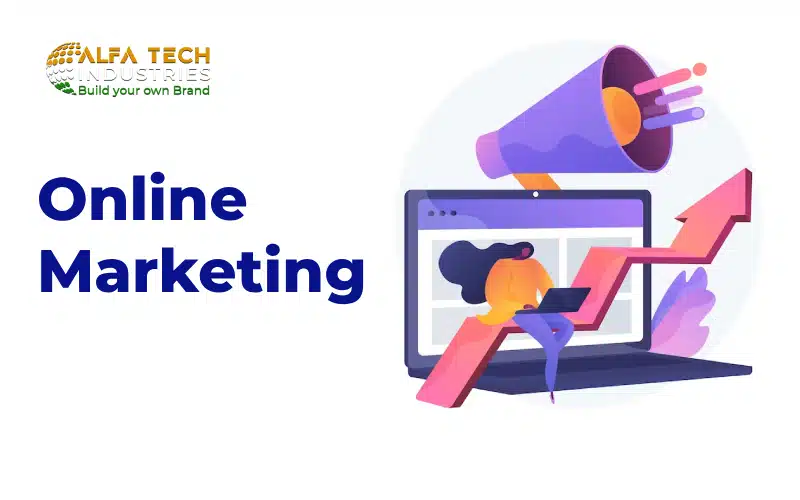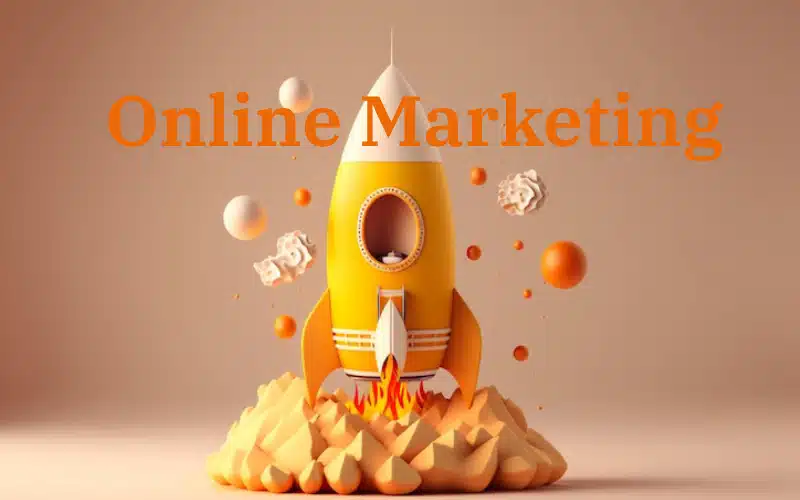Elevate Your Business Affordably with Our Services.
Online marketing, also known as digital marketing, is a broad term that encompasses all marketing efforts conducted over the Internet. It involves promoting products or services through various online channels to reach a target audience and achieve specific business goals. Online marketing has become increasingly important in the digital age, as more people use the internet to research, shop, and connect with businesses. Here are some key components and strategies within Online Marketing.

Website: A well-designed and user-friendly website is often the cornerstone of online marketing. It serves as a hub where customers can learn about your business, products, or services and potentially make purchases.
Search Engine Optimization (SEO): SEO is the process of optimizing your website to rank higher in search engine results pages (e.g., Google).
Social Media Marketing: Leveraging social media platforms (e.g., Facebook, Twitter, Instagram, LinkedIn) to promote your brand, engage with your audience, and drive traffic to your website.
Email Marketing: Sending targeted emails to a list of subscribers or potential customers to promote products, share news, or nurture leads.
Pay-Per-Click Advertising (PPC): Running paid advertising campaigns through platforms like Google Ads or Facebook Ads.
Influencer Marketing: Collaborating with influencers or content creators in your niche to promote your products or services to their engaged audiences.
Online PR and Reputation Management: Managing your online reputation and engaging with online communities and forums to build a positive brand image.
Analytics and Data Analysis: Monitoring and analyzing online marketing performance using tools like Google Analytics to make data-driven decisions and optimize campaigns.
E-commerce Marketing: Strategies and tactics specifically tailored to promoting and selling products online, including strategies like cart abandonment emails and upselling/cross-selling.
Mobile Marketing: Targeting users on mobile devices through mobile apps, mobile websites, and SMS marketing.
Video Marketing: Creating and sharing video content on platforms like YouTube and TikTok to engage audiences and convey information.
An online marketing strategy is a comprehensive plan or set of tactics designed to achieve specific marketing objectives using digital channels and tools. It outlines how a business or organization will leverage the internet and various online platforms to promote its products, services, or brand to reach its target audience effectively. Here are the key components of an online marketing strategy:
Goals and Objectives: Clearly define what you aim to achieve with your online marketing efforts. This could include increasing website traffic, generating leads, boosting sales, improving brand awareness, or enhancing customer engagement.
Target Audience: Identify and understand your ideal customer’s Target audience. Define demographics, interests, behaviors, and pain points to tailor your marketing efforts to their needs.
Competitive Analysis: Research and analyze your competitors to gain insights into their online marketing strategies. Understand what works for them and where you can differentiate yourself.
Online Presence: Evaluate your current online presence, including your website, social media profiles, and other digital assets. Ensure they are optimized for visibility and user experience.
Search Engine Optimization (SEO): Optimize your website and content to improve its visibility in search engine results pages (SERPs). This includes keyword research, on-page optimization, and link-building efforts.
Social Media Strategy: Determine which social media platforms are most relevant to your audience and establish a presence there. Plan your content calendar, posting frequency, and engagement strategies.
Email Marketing: Create an email marketing plan to build and nurture relationships with your audience. Segment your email list for targeted messaging and measure email campaign performance.
Paid Advertising: Decide on paid advertising channels and budgets. This may include pay-per-click (PPC) advertising, social media ads, display ads, or influencer partnerships.
Conversion Optimization: Implement strategies to improve website conversions, such as A/B testing, landing page optimization, and user experience enhancements.
Analytics and Metrics: Set up tracking tools (e.g., Google Analytics) to monitor the performance of your online marketing efforts. Regularly analyze data to make informed decisions and adjust your strategy as needed.
Budget and Resource Allocation: Determine your budget for online marketing activities and allocate resources accordingly. Consider both financial and human resources.
Timeline and Milestones: Create a timeline for your online marketing strategy, including specific milestones and deadlines for each component.
Risk Management: Identify potential risks and challenges that may arise during the execution of your strategy and develop contingency plans.
Monitoring and Reporting: Continuously monitor the performance of your online marketing campaigns and regularly report on key metrics to assess the effectiveness of your strategy.
An effective online marketing strategy should be flexible and adaptable, allowing for adjustments based on real-time data and changing market conditions. It should align with your overall business goals and be consistently reviewed and refined to ensure its continued success in the dynamic digital landscape.
Online marketing is critically important for businesses and organizations in today’s digital age for several compelling reasons:

Widespread Internet Usage: The internet is a ubiquitous part of modern life. Billions of people worldwide use the internet daily to search for information, shop, connect with others, and make decisions. Online marketing allows you to reach this vast and diverse audience.
Global Reach: Online marketing breaks down geographical barriers, enabling businesses to reach a global audience without the limitations of physical locations.
Cost-Effective: Compared to traditional marketing methods like print advertising and TV commercials, online marketing is often more cost-effective. Many digital marketing channels, such as social media and email, offer low-cost or free options to engage with your audience.
Targeted Marketing: Online marketing allows for precise targeting. You can tailor your messages and ads to specific demographics, interests, behaviors, and even individual preferences, ensuring your efforts are seen by those most likely to be interested in your products or services.
Measurable Results: Digital marketing offers robust analytics tools that provide real-time data and insights into campaign performance. You can track metrics like website traffic, conversion rates, click-through rates, and return on investment (ROI), allowing you to make data-driven decisions and optimize your strategies.
Personalization: Online marketing enables personalized communication with customers. You can send tailored messages, product recommendations, and offers based on individual preferences and behavior, enhancing the customer experience and increasing engagement.
Engagement and Interactivity: Digital marketing channels, such as social media and interactive content, foster two-way communication with your audience. This engagement builds stronger relationships and trust with customers.
24/7 Availability: Your online presence, including your website and social media profiles, is accessible around the clock. Customers can interact with your brand and make purchases at any time, increasing convenience.
Competitive Advantage: Many of your competitors are likely already engaged in online marketing. To remain competitive, it’s essential to establish a strong online presence and effectively market your products or services.
Flexibility and Adaptability: This allows for campaigns to be tailored to specific target audiences, as well as to be optimized for different devices and browsers. Online marketing campaigns can also be monitored and tracked in real-time, providing valuable feedback and data for making adjustments. If something isn’t working, you can quickly make changes to your strategy, messages, or targeting to improve results.
Builds Brand Awareness: Online marketing helps build and reinforce brand awareness. Consistent online presence and messaging across various channels help consumers recognize and remember your brand.
Customer Reviews and Feedback: Online platforms provide a forum for customers to leave reviews and provide feedback. Positive reviews can enhance your reputation, while negative feedback can be addressed and managed.
Influencer Marketing: Collaborating with influencers in your niche can expand your reach and credibility, as influencers often have dedicated and engaged followings.
Adaptation to Consumer Behavior: As consumer behavior evolves, online marketing allows you to adapt quickly. For example, the rise of mobile devices has led to mobile marketing strategies and responsive web design.
Data-Driven Decision Making: Online marketing provides a wealth of data that can guide your marketing efforts. This data helps you understand what works, what doesn’t, and where to allocate resources for the best results.
Online marketing encompasses a wide range of strategies and tactics, each designed to reach and engage with your target audience through digital channels. Here are some of the most common types of online marketing:
Search Engine Optimization (SEO):
SEO encompasses the process of enhancing your website and content to achieve improved rankings within search engine results pages (SERPs).The goal is to increase organic (unpaid) traffic by targeting specific keywords and improving website visibility.
Content Marketing:
Content marketing focuses on creating and distributing valuable, relevant, and consistent content to attract and engage your audience. This includes blog posts, infographics, podcasts, articles, videos, and more.
Social Media Marketing:
Leveraging social media platforms (e.g., Facebook, Twitter, Instagram, LinkedIn) to promote your brand, engage with your audience, and drive website traffic. Social media marketing includes organic posting and paid advertising.
Email Marketing:
Sending targeted emails to a list of subscribers or potential customers to promote products, share news, nurture leads, and build customer relationships.
Pay-Per-Click (PPC) Advertising:
Running paid advertising PPC campaigns on search engines (e.g., Google Ads) and other platforms (e.g., Facebook Ads).
Influencer Marketing:
Collaborating with influencers or content creators in your niche to promote your products or services to their engaged audiences.
Video Marketing: Creating and sharing video content on platforms like YouTube, TikTok, and Vimeo to engage audiences and convey information.
Social Media Advertising:
Running paid advertising campaigns specifically on social media platforms to reach a targeted audience. This includes sponsored posts, carousel ads, and video ads.
Content Syndication:
Sharing your content on third-party websites, platforms, or publications to expand your reach and gain exposure to new audiences.
Display Advertising:
Placing visual ads (banners, images, or videos) on websites, apps, and social media platforms to increase brand visibility and drive traffic.
Remarketing (Retargeting): Targeting users who have previously visited your website with tailored ads as they browse other websites or social media platforms.
Mobile Marketing: Strategies and tactics focused on reaching users on mobile devices, including mobile-friendly websites, mobile apps, and SMS marketing.
Local Search Marketing: Optimizing your online presence for local searches to attract customers in a specific geographic area. This is essential for brick-and-mortar businesses.
E-commerce Marketing: Strategies and tactics specifically tailored to promote and sell products online, including cart abandonment emails, product recommendations, and flash sales.
Podcast Marketing: Creating and promoting podcasts to reach an audience interested in your niche or industry. This can include sponsorships and guest appearances on existing podcasts.
Inbound Marketing: A holistic approach that combines various online marketing strategies to attract, engage, and delight customers throughout their buyer’s journey.
Online Public Relations (PR): Managing your online reputation and engaging with online communities and forums to build a positive brand image and address issues or crises.
User-Generated Content (UGC) Marketing: Encouraging customers to create and share content related to your brand or products, thereby increasing brand authenticity and engagement.
Chatbot Marketing: Implementing chatbots on your website or messaging apps to provide automated customer support, answer common questions, and guide users through the sales funnel.
Gaining Google’s trust for online marketing involves building a positive online presence and adhering to Google’s guidelines and best practices. Google’s trust is crucial because it can impact your website’s search engine ranking and visibility in Google search results. Here are steps to gain Google’s trust for online marketing:
Optimize your website for search engines using on-page and technical SEO techniques.
Use relevant keywords naturally in your content.
Implement proper heading tags, meta descriptions, and alt text for images.
Earn high-quality backlinks from reputable websites in your industry.
Avoid spammy or low-quality backlinks, as they can harm your website’s trustworthiness.
Provide an excellent user experience by creating a user-friendly and well-designed website.
Ensure easy navigation, clear calls to action, and a responsive design.
Mobile Optimization:
Optimize your website for mobile devices, as Google prioritizes mobile-friendly sites in search results.
Use responsive design or create a separate mobile version of your site.
Page Speed:
Improve website loading speed to enhance user experience and SEO.
Regular Updates:
Keep your website and content up-to-date to show that your site is actively maintained.
Remove or update outdated information.
Avoid Black-Hat Tactics:
Stay away from black-hat SEO practices such as keyword stuffing, cloaking, or buying links, as these can lead to penalties and loss of trust.
Google Webmaster Guidelines:
Familiarize yourself with Google’s Webmaster Guidelines and follow them diligently.
Stay informed about any updates or algorithm changes that Google announces.
Positive Online Reputation:
Encourage positive reviews and testimonials from customers.
Address negative reviews and complaints professionally and promptly.
Structured Data and Schema Markup:
Implement structured data and schema markup to help Google understand your content better and display rich snippets in search results.
Google My Business:
If you have a local business, claim and optimize your Google My Business listing to enhance local search visibility.
Social Signals:
Maintain an active presence on social media platforms and share your content to increase brand visibility and engagement.
Transparency and Authenticity:
Avoid deceptive or misleading practices, as they can harm your credibility.
Gaining Google’s trust is an ongoing process that requires consistent effort and adherence to best practices. Keep in mind that it may take time to see improvements in your search rankings, but a trustworthy and user-friendly website will benefit your online marketing efforts in the long run.
In conclusion, online marketing is an indispensable component of modern business strategies. It leverages the power of the internet and digital channels to connect with a vast and diverse audience, promote products and services, and achieve various business goals. Its significance lies in its ability to reach potential customers where they spend a significant amount of their time – online.
Online marketing offers numerous advantages, including cost-effectiveness, precise targeting, and the ability to measure and adjust campaigns in real-time. It facilitates engagement with customers, builds brand awareness, and fosters long-lasting relationships. Moreover, it adapts to changing consumer behaviors and technology trends, ensuring businesses remain competitive in a dynamic digital landscape.
To succeed in an Online Marketing Company in Madurai, organizations must develop well-rounded strategies that encompass various tactics such as search engine optimization, content marketing, social media promotion, email marketing, and paid advertising. Building trust with search engines like Google is crucial for visibility and credibility.
As technology continues to evolve and consumer preferences shift, staying informed about the latest trends and continuously optimizing online marketing efforts is essential. In this fast-paced digital era, online marketing is not merely a choice but a necessity for businesses seeking sustainable growth and success.
Online marketing, also known as digital marketing, is the practice of promoting products, services, brands, or ideas using digital channels and technology, primarily on the internet.
Online marketing is crucial because it allows businesses to reach a vast audience, target specific demographics, track results, and adapt to changing consumer behaviors in a cost-effective manner.
Key components include search engine optimization (SEO), content marketing, social media marketing, email marketing, pay-per-click (PPC) advertising, and more.
Improve SEO by optimizing content, using relevant keywords, earning high-quality backlinks, improving website speed, and ensuring mobile-friendliness.
Organic marketing refers to non-paid strategies like SEO and content marketing, while paid marketing involves paid advertising methods like PPC and social media ads.
You can measure success by tracking key performance indicators (KPIs) such as website traffic, conversion rates, click-through rates, and return on investment (ROI).
Choose platforms based on your target audience’s preferences. Common choices include Facebook, Instagram, Twitter, LinkedIn, and TikTok.
Build a list by offering valuable content or incentives in exchange for email sign-ups, using pop-up forms, and promoting your email newsletter across digital channels.
Influencer marketing involves collaborating with influential individuals in your niche to promote your products or services to their engaged audiences. It can build credibility and expand your reach.
Protect your online reputation by monitoring online mentions, addressing negative feedback professionally, encouraging positive reviews, and being transparent and authentic.
Analytics tools like Google Analytics provide data insights that help you track campaign performance, make data-driven decisions, and optimize your online marketing strategies.
The future of online marketing is likely to involve increased use of artificial intelligence (AI), personalization, voice search optimization, and continued growth in mobile marketing.
Alfa Tech Industries: Best Digital Marketing Company in Madurai, India & Mujarrah Sharjah, UAE. Expert team, tailored strategies, drive website traffic, generate leads, boost sales.
Explore Call Now Button
Call Now Button

